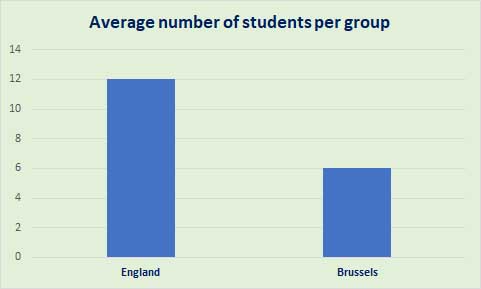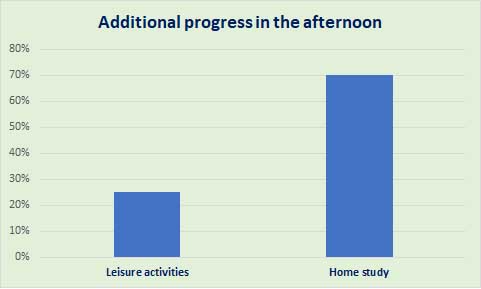Do you know how to choose a course that will improve your English rapidly?
Comparison of residential English lessons and local English lessons
Many people are convinced that they can only improve their level of English if they go to an English-speaking country, whether it is England, Scotland, Ireland, the USA, Canada or even Australia.
The English Academy staff is in a unique position to compare residential English lessons abroad with intensive English group lessons that are taught locally in Brussels because we have an extended experience organising both types of full immersion English classes and we received and analysed the comments of hundreds of former students.

We compared 5 essential factors that are essential to improve your English:
1. The teachers
Both in England and in Brussels, the lessons are taught by native English teachers.
The main difference is that our teachers in Brussels work as English teachers all year round, whereas teachers in England often only teach in the summer period.
If you know that teaching experience is essential to become a real good language teacher, this difference cannot be neglected. There is also a very high turnover of teaching staff in England and Ireland, which does not improve the quality of the teaching.

2. Class size
At the English Academy, we only accept 4 to 8 people per group. That is a ground rule that is never broken. In the residential English language schools we worked with in the UK, 12 (to 15) students per group was the norm. The makes a huge difference.
With an average of 6 students in our Brussels’ groups, we can be sure that everybody can participate, talk, be corrected, and gets the answers to individual questions. With double that number of people in class, this kind of interaction becomes very difficult and lessons become more passive.
2. Class size
At the English Academy, we only accept 4 to 8 people per group. That is a ground rule that is never broken. In the residential English language schools we worked with in the UK, 12 (to 15) students per group was the norm. The makes a huge difference.
With an average of 6 students in our Brussels’ groups, we can be sure that everybody can participate, talk, be corrected, and gets the answers to individual questions. With double that number of people in class, this kind of interaction becomes very difficult and lessons become more passive.

3. Quality control
When we received several bad comments about a certain language school, we stopped sending over students to that school and continued working with other schools which had received more positive feedback. Some schools in English seemed to be really good. Nonetheless, we continued to receive negative remarks about them occasionally. It was hard to judge if those remarks were justified or not, since we were not present locally. For instance: the host families of the same language school could vary strongly, from excellent to substandard.
That kind of problem does not occur in our own classrooms in Brussels, where we organise everything ourselves so that we can be sure that our quality standards are met and where we can immediately check whether a remark is justified or not so that improvements can be made if required. Since we know how to improve your English, this control is essential.
4. Unforeseen costs
Both the residential lessons abroad as well as our local English group lessons have a fixed price you will know prior to your registration. The difference is that residential courses in England or Ireland often require a supplementary budget for non-teaching activities, such as travel, food and drinks, etc. Please be aware of this. For our lessons in Brussels, you don’t need such an additional budget for meals and non-classroom activities.
The fact that you don’t have to pay for accommodation makes it considerably more cost-effective. Our school can easily be reached by public transportation. Central Station is only a couple of metro stops away.
5. The leisure activities
Often, residential English language schools in Great-Britain teach their students only in the morning. In the afternoon, they organise group leisure activities such as sports and excursions. We noticed that during these activities, students from different countries tend to group together and start speaking their mother tongue amongst each other. (A lot of English schools are well-known in one particular country so that a large part of their student population comes from that single country, whereas we have a very international audience in our intensive holiday group lessons in Brussels.)
Instead of such leisure activities, we recommend that our students work at home in the afternoon, studying and applying what they learned in the morning. Our experience teaches us that this is how they can improve their English faster.

Conclusion on how to improve your English
We gathered this information during the dozens of years that we collaborated with local schools in Britain, Ireland and the USA that organised residential intensive English language classes.
Although many students were satisfied with their immersion language programmes abroad, the English Academy management decided that there were too many complaints and factors that were beyond our control.
Residential lessons in England and elsewhere don’t live up to our standards, for the reasons explained above.
Therefore, we decided years ago not to send students abroad anymore.
We now focus fully on our own intensive English immersion programmes that we organise ourselves during all Belgian holiday periods. This allows us to deliver the quality and progress that you deserve.
